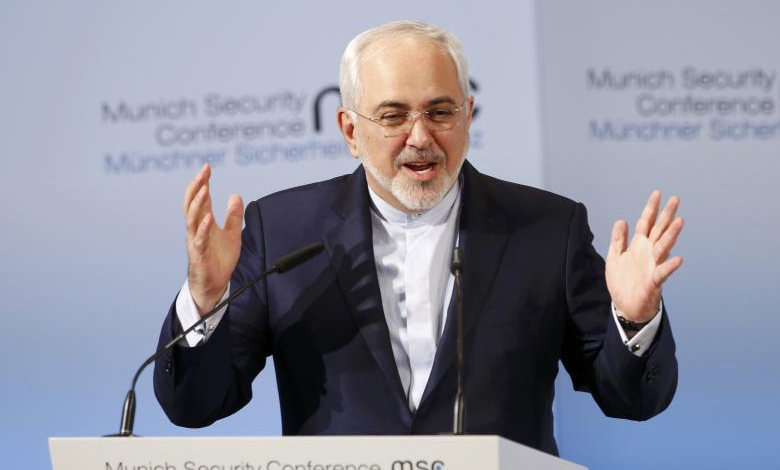Monday 20 February 2017 - 13:57
Story Code : 251745
Iran's Zarif at MSC: We will never produce nuclear weapons, period!
Addressing the conference opened in Munich on Feb 17, Zarif stressed that in a world where security actors have multiplied, no single power, however disproportionately powerful or even a concert of major powers can address global or regional challenges by excluding or blaming others.
�I believe what is urgently needed today is a cognitive transition, commensurate with the realities of the global transition; realities that have challenged zero-sum approaches; overwhelmed global as well as regional hegemonic aspirations; and undermined convenient framings and 'alternative facts,� Zarif said.
The Iranian FM stepped up efforts to improve ties with Gulf Arab Sunni states urging them to work with their Shi'ite rival to address "anxieties" and violence across the region, as well.
Nuclear Weapons
Iranian foreign minister underlined that that Iran would never seek to build a nuclear weapon, taking an apparent shot at Israel for being the true nuclear-armed actor endangering the region.
"We will never produce nuclear weapons, period," Zarif said. The Iranian foreign minister added that Iran had committed to this in the nuclear, but has yet to receive the reciprocal fulfilling of the deal from the other side. "The international community still owes us," Zarif stated.
In apparent response to US President Donald Trump's comments that he was putting Iran "on notice" over ballistic missile tests last month, Zarif stated that, "We do not respond well to threats, we respond to respect."
Zarif meetings in Munich confab margins
Accompanied by his deputies, Zarif arrived in Munich on Friday morning to attend the 53rd Munich Security Conference; he also held talks with several world senior officials in Germany on the sidelines of Munich Security Conference.
Zarif and his entourage have conferred with various senior officials of the world countries such as the European Union foreign policy chief Federica Mogherini, Iraqi Prime Minister Haider al-Abadi, UN Secretary General Antonio Guterres,� President of the Iraqi Kurdistan Region Masoud Barzani, UN Special Envoy for Syria Staffan de Mistura, Director General of the International Atomic Energy Agency (IAEA) Yukia Amano, ministers of foreign affairs of Spain, Oman, England, Russian Federation, Turkey, France, Slovenia, Sweden, Afghanistan,� Norwegian, German, Ukraine, Syria etc.
Implementation of JCPOA
Talking to Zarif, Mogherini stressed the �need for a full and effective implementation by all sides throughout the lifetime of the agreement� known as the Joint Comprehensive Plan of Action (JCPOA).
In the meantime, Omani FM hailed Iran�s role in recent regional developments, calling for expansion of mutual cooperation between the two courtiers.
Zarif and Staffan de Mistura also exchanged views on Syrian issue.
Meanwhile, the UN Elders and Zarif reviewed different issues, including Daesh (the ISIS terrorist group), the crises in Syria, Yemen and Lebanon and other regional issues were discussed during the meeting.
Grave Regional Conditions
In the meantime, Zarif and Guterres discussed international and regional issues, including the situation in Yemen, Syria and Iraq and the grave conditions of Rohingya Muslims in Myanmar.
Also in a meeting with Carl Bildt, the former prime minister of Sweden, the two officials discussed issues of mutual interest.
In separate meetings between Zarif and his Norwegian counterpart and the head of Foreign Policy Commission of the German Parliament, the ways for reinforcement of mutual cooperation were discussed.
Astana Consultations
Moreover, Zarif and his Russian counterpart Sergey Lavrov discussed the situation in Syria and Russia-Iran relations and reviewed bilateral relations, including the schedule of upcoming contacts on various levels.
According to a statement released on Friday 'the ministers also exchanged opinions on the Syrian agenda in the context of the recent Astana consultations.'
The 53rd Munich Security Conference is attended by 10 presidents, US Vice President Mike Pence, eight prime ministers, ministers of foreign affairs from 30 countries, ministers of defense from around 20 countries as well as the secretary generals of the United Nations, North Atlantic Treaty Organization (NATO), Organization of the Islamic Cooperation, Arab League and the Shanghai Cooperation Organization.
The three-day MSC kicked off on Friday in Munich, Germany and it was discussed major international issues including NATO future, global order, human security, terrorism and extremism.
# Tags











